We're still on winter break, so my subbing stories from the last week of the semester will wait until next week. For today's Thursday 13, I've compiled some internet "laws" that various people have come up with. By "laws", we mean in the scientific sense, not the legal sense. But unlike real scientific laws, I don't think anyone has actually done the work to prove these.
I relied heavily on Wikipedia for this as the definitions there were written the most succinctly. I also cribbed a bit from this blog post from 2009 that I stumbled across.
1. Poe's Law
Taken from Wikipedia: Poe's law is an adage of internet culture which says that, without a clear indicator of the author's intent, any parodic or sarcastic expression of extreme views can be mistaken by some readers for a sincere expression of those views.
This one is the reason for the list today. I ran across a post on social media that had sparked debate. (I didn't save it, so I can't recall what it was about.) Someone argued Poe's law (as opposed to taking the post seriously). And I realized that this would make an excellent topic as there were several others that immediately popped in my head.
2. Muphry's Law
From Wikipedia: If you write anything criticizing editing or proofreading there will be a fault of some kind in what you have written.
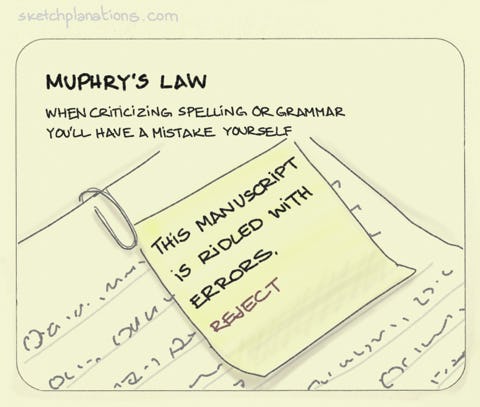 |
| Via Sketchplanations |
Ever since hearing of this, I have been very, very careful when noticing errors online. I'm completely paranoid. When I'm tempted to point it out, I resist. (Here's another link about it.) There are several related corollaries, but I won't specify them here.
Also from Wikipedia: Anything that can go wrong, will—at the worst possible moment.
4. Godwin's Law
This one may be one of the oldest memes on the internet. Via Wikipedia: Godwin's law, short for Godwin's law of Nazi analogies, is an Internet adage asserting that as an online discussion grows longer, the probability of a comparison to Nazis or Adolf Hitler approaches 1.
This was funnier before more recent times.
I refer to this one frequently. It's something that you can really see with teenagers.
Again, Wikipedia boils it down quite well: The Dunning–Kruger effect is a cognitive bias in which people with limited competence in a particular domain overestimate their abilities.
Or, in other words, absolute beginners think they know way more than people with experience do. And don't we see this one all the time everywhere?
6. Rule 34
If it exists, there is porn of it. (Wikipedia actually has a longer version definition.)
While I was compiling this list, I stumbled across this one, and I could have smacked myself. Because this one I knew, but I had completely forgotten it. It rears its head every so often, and every time I'm like, oh right, I know this one.
I, uh... don't want to find an image to go with this one. I have a feeling that's going to go very, very badly.
7. Rule 35
If no such porn exists, it will be made.
Just in case you thought you could find an exception to rule 34. (There's a whole list of these. This link goes to TV Tropes, but I'm sure you can find it elsewhere as well. Be warned: TV Tropes is a rabbit hole that you might not get out of, so don't click any links.)
Again, via Wikipedia: The Streisand effect is an unintended consequence of attempts to hide, remove, or censor information, where the effort instead backfires by increasing awareness of that information.
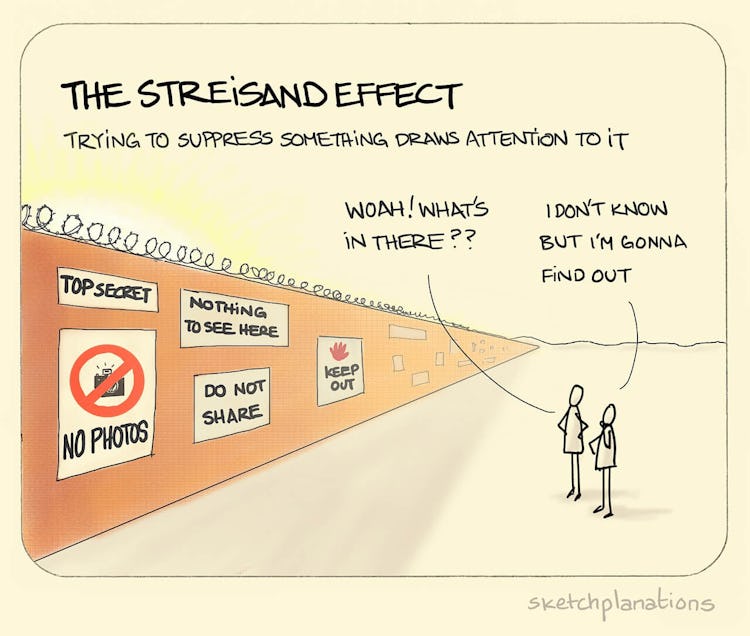 |
| Via Sketchplanations |
This, of course, was named after Barbra Streisand, and there's a whole story behind it.
Also known as the bullshit asymmetry principle, here's Wikipedia's definition: The amount of energy needed to refute bullshit is an order of magnitude bigger than that needed to produce it.
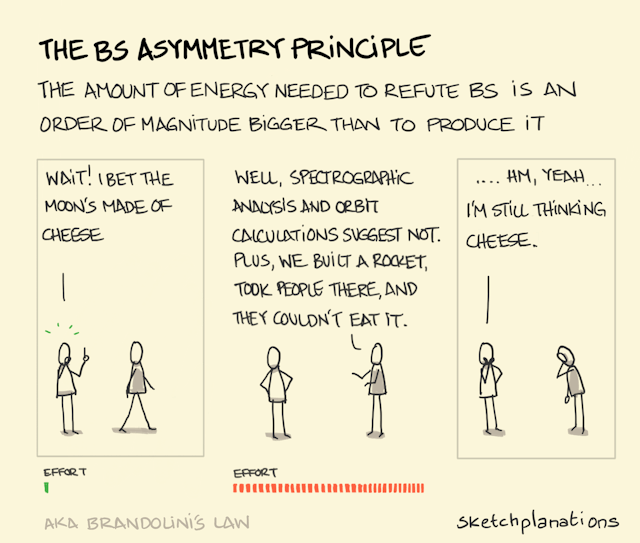 |
| Via Sketchplanations |
10. Hanlon's Razor
Never attribute to malice that which is adequately explained by stupidity. (Or, alternatively: Do not invoke conspiracy as explanation when ignorance and incompetence will suffice, as conspiracy implies intelligence.)
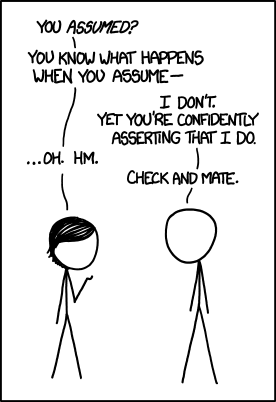 |
| Via xkcd: When You Assume |
11. Cunningham's Law
The best way to get the right answer on the Internet is not to ask a question; it's to post the wrong answer.
 |
| Via xkcd: Duty Calls |
When I saw this one, I laughed. Because it feels true, doesn't it? (There are some long-winded articles about it, too.)
12. Hofstadter's Law
It always takes longer than you expect, even when you take into account Hofstadter's Law.
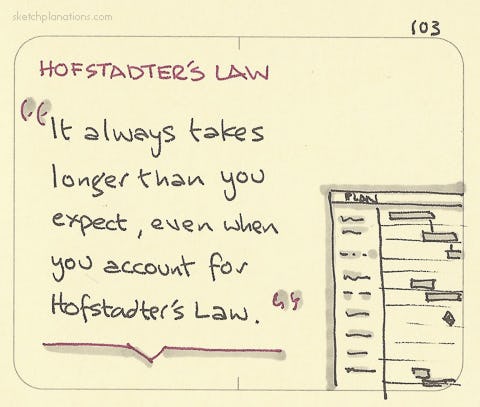 |
| Via Sketchplanations |
13. Kranzberg's laws of technology
Well, there are six, but I'll only type out the first: Technology is neither good nor bad; nor is it neutral. The others are in this graphic. (Clicking on it should make it bigger so you can see it.)
Or, if you prefer, here's a longer article on them.
Which of these had you heard of before?


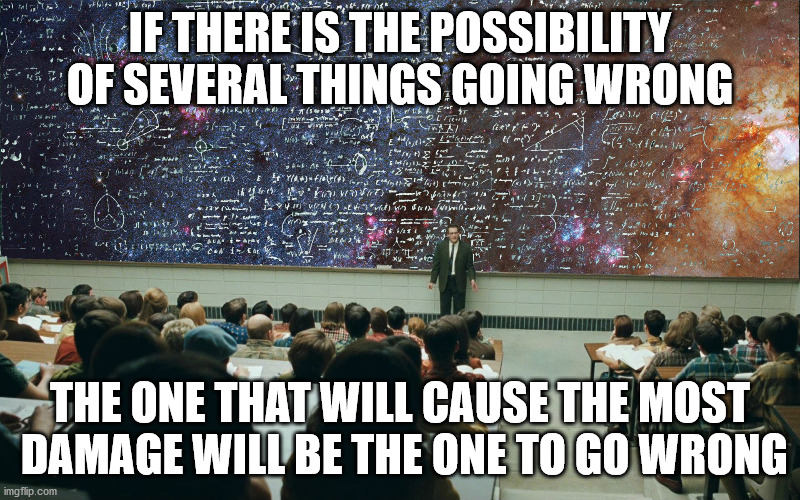


Some of these are new to me. I do agree with that #1! Kind of like those people who still insist, "I read it online, it must be true." I have heard of #6. Murphy's of course, that one is the classic.
ReplyDeleteAh, but I didn't include Murphy's Law. Muphry's Law is a deliberate misspelling...
DeleteThis was a great post. You got most of the important ones, and I hadn't heard of Kranzberg's before.
ReplyDeleteWow! I had no idea there were so many laws. I knew of Murphy's Law, but not the others. Happy New Year!
ReplyDeleteI love Muphry's Law and am constantly aware of it. But I don't think it's the same as the one you think it is.
DeleteI didn't know any of these. lol Well, we learn something new everyday.
ReplyDeleteI discovered some of these as I wrote the post.
DeleteSilly me, I did know the Streisand Effect. lol Anyway, I forgot to leave my name yet again.
DeleteThose are so interesting! I knew practically none as internet rules but recognize most as "a thing." Finagle's Law is the next step above Murphy's law which I think is an Irish motto.
ReplyDeleteI figured everyone knows Murphy's Law, and when I saw Finagle's Law, I knew that not everyone had seen that.
DeleteI don't think I knew any of this. I know of the 411 rule and the I D 10 T rule, but that's about it. Cool post.
ReplyDeletehahahaha, which “law” covers people who’ll give names to patterns of behavior sarcastically? Great topic, Liz. I’ve seen several of these “laws” in action. #9 reigns big among our local officials and wannabes, boooo.
ReplyDeleteFascinating, amusing and scary all at the same time!
ReplyDelete
ReplyDeletethecontemplativecat here. I have Murphy's law memorized.
Which is why I didn't include it. I figure everyone knows that one.
DeleteI have heard of a few. #14 should be, "the internet is best taken in small doses".
ReplyDeleteThat one probably exists someplace (and if it doesn't, it should). I was limited in list to 13, although I didn't find more than that anyway.
Delete"Never attribute to malice that which is adequately explained by stupidity." YES! And, I, too, long for the days when comparing a world leader to Hitler was hyperbole. That is not where are now.
ReplyDeleteGodwin himself has said if the comparison is apt to do it.
Delete